This is part II of our three part series on how to build a sliding door.
Trolley Mounting Instructions
Insert trolley mounting bolts into previously drilled door grid top lateral. See Figure 27-5.
Assemble star washer, flange nut and locknut, and adjust on pendant bolts until there is approximately one inch between trolley bolt head and door grid top lateral.
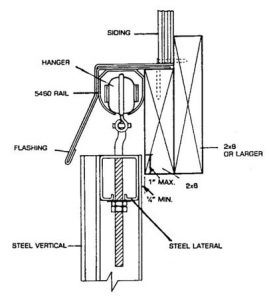
Figure 27-5
Install sliding door track to top of track board previously installed. See Figure 27-5. On doors 10’ or less in width start track 12” in from sliding door opening; for wider doors, 24”.
End caps are not a provided or required item for the sliding door track.
Track for bi-parting doors installs with a 24” trackless space (48” space if doors are wider than 10’) at the center of the track board.
Hang completed door in track (this normally requires two people minimum).
Adjust door to required height with flange nut and tighten lock nut.
Adjust offset pendant bolts of trolleys so door hangs flush against building side, by using wrench to turn flat sided drop bolt. To secure system, bend opposite tabs of star washer into slot opening of top lateral.
Many have found it helpful to drill a hole horizontally through installed door rail within ½ inch of each end, then place a 20d or 40d nail through holes and driven into track board. This nail is an added emergency safety to prohibit trolleys from exiting ends of track.
Install door track cover trim across top of track board only (unless instructions on Material Takeoff instruct otherwise). Attach to 2×8 header using joist hanger nails close to each end and approximately every 3’.
Guide Rail
With sliding door panel in full open position, make a pencil line on building face closest to door opening, at bottom door edge.
Slide door to closed position. Guide rail may have to be cut to length. Typically, guide rail is about half to 60 percent of sliding door width. If building has more than one sliding door, this determination can be made by comparing guide rail lengths sent to door widths.
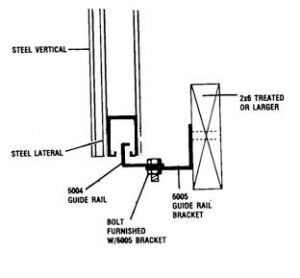
Figure 27-6
Select (or cut) an appropriate guide rail for door width. Turn guide rail upside down, so slots are visible. Line up one rail with door opening edge and mark slot locations on wall one (1) inch above pencil line. *Painted white vertical will need a notch cut to allow the guide rail to slide through the vertical rail. See Figure 27-6
Install wall brackets with either nails or siding screws. Optionally a lag bolt (not provided) may be used. Nail holes are in bracket vertical leg.
Bolt guide rail to brackets, finger tight, with carriage bolts and lock nuts.
See Figure 27-7
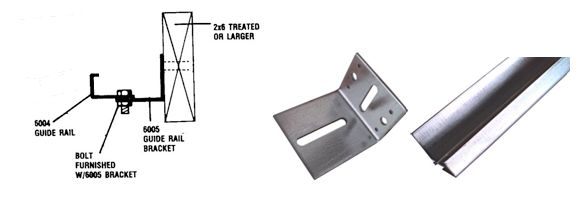
Figure 27-7
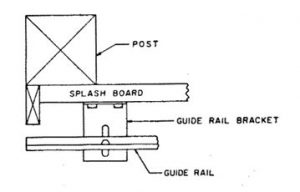
Figure 27-8
Vertical View of Guide Rail Bracket and Guide Rail Installation
See Figure 27-8
Make final adjustments by opening door and checking clearances. Tighten all bolts and nails through holes provided in brackets.
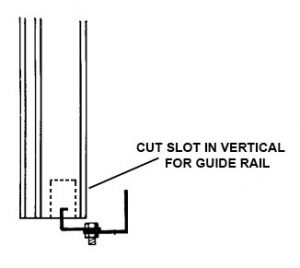
Figure 27-9
A “slot” will need to be cut in the vertical door rail closest to the guide rail, to allow the guide rail to fit into the bottom lateral of the door. See Figure 27-9.
Important – Do this step before assembling the entire door together.
Figure 27-9
Jamb stop mounts to sliding door opening columns on each side). Mount stop at a convenient height, usually approximately 3′ above grade and at a point where it will not interfere with one of the steel door laterals. With sliding door closed, mount stop to column, so stop curve fits snugly into door vertical side rail. See Figure 27-10.
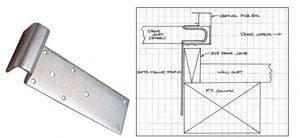
Figure 27-10
Side Mounted Jamb Latch
Jamb latch mounts to sliding door opening post away from direction door slides open (side opposite jamb mount stop).
Close door. Select a lateral door member which is at a convenient height. Align vertical member edge with door jamb surface.
Mount latch catch with the two legs toward door front. Keep slot for hook in line with hook on jamb latch.
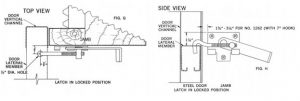
Figure 27-11
See Figure 27-11
Attach latch main body to building column. Keep latch hook parallel to latch catch top mounted on lateral. With latch handle straight up mount latch with end hook in hole on latch catch. Pull handle down toward door to secure door tight to jamb. Cam latch can be mounted either right or left handed. Remove nut and turn hook over and re-attach nut. (Do before mounting to door jambs.)
Come back for Part III of three parts.






